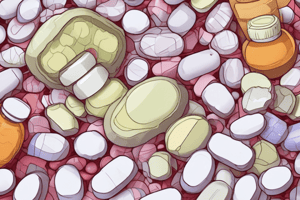Podcast
Questions and Answers
What is a potential side effect of potassium-sparing diuretics?
What is a potential side effect of potassium-sparing diuretics?
- Hypoglycemia
- Hypokalemia
- Hypertension
- Hyperkalemia (correct)
Which of the following is NOT a known side effect of aldosterone antagonists?
Which of the following is NOT a known side effect of aldosterone antagonists?
- Testicular atrophy
- Gynecomastia
- Hypertension (correct)
- Menstrual irregularities
What is a potential drug interaction that can affect the effectiveness of diuretics?
What is a potential drug interaction that can affect the effectiveness of diuretics?
- Antibiotics
- Antidepressants
- Herbal remedies (correct)
- Antihistamines
Which of the following symptoms is NOT associated with morphine sulfate?
Which of the following symptoms is NOT associated with morphine sulfate?
What is the mechanism of action of morphine sulfate?
What is the mechanism of action of morphine sulfate?
What is the primary function of naloxone?
What is the primary function of naloxone?
Which of the following should be avoided after administering morphine sulfate?
Which of the following should be avoided after administering morphine sulfate?
What is the primary purpose of administering morphine sulfate?
What is the primary purpose of administering morphine sulfate?
What is the primary use of aspirin?
What is the primary use of aspirin?
Which of the following conditions should aspirin not be given to children?
Which of the following conditions should aspirin not be given to children?
What is a major risk associated with the use of acetaminophen?
What is a major risk associated with the use of acetaminophen?
Ibuprofen is primarily used to treat which of the following?
Ibuprofen is primarily used to treat which of the following?
What should be avoided while taking aspirin due to increased effects?
What should be avoided while taking aspirin due to increased effects?
What is a common gastrointestinal side effect of both aspirin and ibuprofen?
What is a common gastrointestinal side effect of both aspirin and ibuprofen?
Which of the following drugs is classified as a non-narcotic analgesic?
Which of the following drugs is classified as a non-narcotic analgesic?
Ibuprofen should be used cautiously in which type of patients?
Ibuprofen should be used cautiously in which type of patients?
What dietary modification is recommended for patients taking furosemide?
What dietary modification is recommended for patients taking furosemide?
Which side effect is associated with both furosemide and hydrochlorothiazide?
Which side effect is associated with both furosemide and hydrochlorothiazide?
What is the primary function of loop diuretics like furosemide?
What is the primary function of loop diuretics like furosemide?
When should furosemide ideally be administered to minimize sleep disruption?
When should furosemide ideally be administered to minimize sleep disruption?
What condition is a potential risk associated with the use of both types of diuretics mentioned?
What condition is a potential risk associated with the use of both types of diuretics mentioned?
What monitoring is essential for patients taking hydrochlorothiazide?
What monitoring is essential for patients taking hydrochlorothiazide?
Which of the following is a contraindication for furosemide use?
Which of the following is a contraindication for furosemide use?
What should patients taking hydrochlorothiazide be educated to do?
What should patients taking hydrochlorothiazide be educated to do?
Which of the following would be considered a potential side effect of rifampin?
Which of the following would be considered a potential side effect of rifampin?
What is the primary mechanism of action for rifampin?
What is the primary mechanism of action for rifampin?
What is the primary use of rifampin?
What is the primary use of rifampin?
Which of the following is a specific instruction for patients taking rifampin?
Which of the following is a specific instruction for patients taking rifampin?
Which of the following is a reason for a patient taking rifampin to contact their doctor immediately?
Which of the following is a reason for a patient taking rifampin to contact their doctor immediately?
Which of the following antibiotics is NOT mentioned in the text as being used to treat bacterial infections?
Which of the following antibiotics is NOT mentioned in the text as being used to treat bacterial infections?
What is the primary mechanism by which penicillins work to treat bacterial infections?
What is the primary mechanism by which penicillins work to treat bacterial infections?
Which of the following is a potential side effect of both penicillins and cephalosporins?
Which of the following is a potential side effect of both penicillins and cephalosporins?
What is the recommended course of action for a patient experiencing new diarrhea while taking an antibiotic?
What is the recommended course of action for a patient experiencing new diarrhea while taking an antibiotic?
Why is it crucial to finish the entire course of antibiotics prescribed, even if symptoms improve?
Why is it crucial to finish the entire course of antibiotics prescribed, even if symptoms improve?
Which of the following is a recommended practice before starting antibiotic treatment?
Which of the following is a recommended practice before starting antibiotic treatment?
What is the primary reason for obtaining cultures before starting antibiotic treatment?
What is the primary reason for obtaining cultures before starting antibiotic treatment?
Which of the following statements about cephalosporins is TRUE?
Which of the following statements about cephalosporins is TRUE?
What is a serious potential side effect of taking ciprofloxacin?
What is a serious potential side effect of taking ciprofloxacin?
What is the primary action of aminoglycosides like gentamicin?
What is the primary action of aminoglycosides like gentamicin?
Which of the following should be monitored when administering erythromycin?
Which of the following should be monitored when administering erythromycin?
What is an important dietary consideration for patients taking INH (isoniazid)?
What is an important dietary consideration for patients taking INH (isoniazid)?
What should be done before starting any antibiotic therapy?
What should be done before starting any antibiotic therapy?
Which statement is true regarding the effectiveness of contraceptives when taking certain antibiotics?
Which statement is true regarding the effectiveness of contraceptives when taking certain antibiotics?
What is a key monitoring parameter for patients taking aminoglycosides?
What is a key monitoring parameter for patients taking aminoglycosides?
Which of the following is a common gastrointestinal side effect of antibiotics?
Which of the following is a common gastrointestinal side effect of antibiotics?
What is the primary mechanism of action for guaifenesin?
What is the primary mechanism of action for guaifenesin?
Which of the following is a potential adverse effect of diphenhydramine?
Which of the following is a potential adverse effect of diphenhydramine?
What is the primary use of diphenhydramine?
What is the primary use of diphenhydramine?
What specific instruction should be provided to patients taking guaifenesin?
What specific instruction should be provided to patients taking guaifenesin?
Which of the following is a contraindication for the use of diphenhydramine?
Which of the following is a contraindication for the use of diphenhydramine?
Flashcards
What is aspirin?
What is aspirin?
Aspirin is a medication that reduces pain, fever, and inflammation. It also helps prevent blood clots.
How does aspirin reduce inflammation?
How does aspirin reduce inflammation?
Aspirin reduces inflammation by inhibiting the production of prostaglandins, which are chemicals that trigger pain and inflammation in the body.
Why should you avoid alcohol with aspirin?
Why should you avoid alcohol with aspirin?
Consuming aspirin with alcohol can increase the risk of side effects like stomach bleeding and ulcers.
What is acetaminophen?
What is acetaminophen?
Signup and view all the flashcards
How is acetaminophen processed?
How is acetaminophen processed?
Signup and view all the flashcards
What is ibuprofen?
What is ibuprofen?
Signup and view all the flashcards
What are some considerations while taking ibuprofen?
What are some considerations while taking ibuprofen?
Signup and view all the flashcards
Why is ibuprofen commonly used?
Why is ibuprofen commonly used?
Signup and view all the flashcards
Loop Diuretic
Loop Diuretic
Signup and view all the flashcards
Furosemide
Furosemide
Signup and view all the flashcards
Ototoxicity
Ototoxicity
Signup and view all the flashcards
Hypokalemia
Hypokalemia
Signup and view all the flashcards
Thiazide Diuretic
Thiazide Diuretic
Signup and view all the flashcards
Hydrochlorothiazide
Hydrochlorothiazide
Signup and view all the flashcards
Potassium Sparing Diuretic
Potassium Sparing Diuretic
Signup and view all the flashcards
Spironolactone
Spironolactone
Signup and view all the flashcards
Aldosterone antagonist
Aldosterone antagonist
Signup and view all the flashcards
Morphine Sulfate
Morphine Sulfate
Signup and view all the flashcards
Opioid Agonists
Opioid Agonists
Signup and view all the flashcards
Respiratory Depression
Respiratory Depression
Signup and view all the flashcards
Addiction
Addiction
Signup and view all the flashcards
Withdrawal Syndrome
Withdrawal Syndrome
Signup and view all the flashcards
Rifampin
Rifampin
Signup and view all the flashcards
Hepatotoxicity
Hepatotoxicity
Signup and view all the flashcards
Decreased effectiveness of oral contraceptives
Decreased effectiveness of oral contraceptives
Signup and view all the flashcards
Bone marrow suppression
Bone marrow suppression
Signup and view all the flashcards
Drug Interactions
Drug Interactions
Signup and view all the flashcards
Penicillins
Penicillins
Signup and view all the flashcards
Ampicillin
Ampicillin
Signup and view all the flashcards
Allergic Reaction
Allergic Reaction
Signup and view all the flashcards
Superinfection
Superinfection
Signup and view all the flashcards
Cefazolin
Cefazolin
Signup and view all the flashcards
Cephalosporins
Cephalosporins
Signup and view all the flashcards
C. diff
C. diff
Signup and view all the flashcards
Obtain Cultures
Obtain Cultures
Signup and view all the flashcards
Ciprofloxacin
Ciprofloxacin
Signup and view all the flashcards
Fluoroquinolones
Fluoroquinolones
Signup and view all the flashcards
Aminoglycosides
Aminoglycosides
Signup and view all the flashcards
Erythromycin
Erythromycin
Signup and view all the flashcards
Macrolides
Macrolides
Signup and view all the flashcards
INH (Isoniazid)
INH (Isoniazid)
Signup and view all the flashcards
Antituberculosis Agents
Antituberculosis Agents
Signup and view all the flashcards
What is Guaifenesin?
What is Guaifenesin?
Signup and view all the flashcards
What is Diphenhydramine?
What is Diphenhydramine?
Signup and view all the flashcards
What are some common side effects of Diphenhydramine?
What are some common side effects of Diphenhydramine?
Signup and view all the flashcards
How should you take Guaifenesin?
How should you take Guaifenesin?
Signup and view all the flashcards
What is Guaifenesin used for?
What is Guaifenesin used for?
Signup and view all the flashcards
Study Notes
Aspirin
- Generic Name: Aspirin
- Therapeutic Class: Analgesic, antiplatelet, antipyretic, salicylate
- Pharmacologic Class: Salicylates
- Indication: Relieves pain, fever, inflammation, Kawasaki disease, prevention of thrombotic events
- Action: Inhibits prostaglandins, producing anti-inflammatory effects, decreased platelet function, reduced hemorrhage risk
- Adverse Effects: Reye's syndrome, salicylism, GI bleeding, tinnitus, GI upset, rash
- Side Effects: Tinnitus, GI upset, rash
- Nursing Considerations: Should not be taken with alcohol or ginkgo due to increased effects.
- Patient Teaching: Take with a full glass of water and food to reduce stomach upset. Keep out of children's reach. Do not give to children with chickenpox or influenza.
Acetaminophen
- Generic Name: Acetaminophen
- Therapeutic Class: Analgesic, antipyretic
- Pharmacologic Class: Non-narcotic analgesic, antipyretic
- Indication: To treat mild to moderate pain and fever.
- Action: Inhibits prostaglandin synthesis.
- Adverse Effects: Liver toxicity, liver failure, serious skin reactions, GI upset.
- Side Effects: GI upset
- Nursing Considerations: Interactions with alcohol, anticholinergics, barbiturates, oral anticoagulants. Administer IV over 15 minutes.
- Patient Teaching: Do not exceed recommended dose, do not take longer than 10 days. Report any difficulty breathing or rash.
Ibuprofen
- Generic Name: Ibuprofen
- Therapeutic Class: Analgesic
- Pharmacologic Class: Nonsteroidal anti-inflammatory drug (NSAID)
- Indication: To treat mild to moderate pain, fever, inflammation.
- Action: Inhibits prostaglandin synthesis, lowers inflammation, lowers platelet aggregation.
- Adverse Effects: Risk of GI bleeding, ulceration, perforation, higher risk of cardiovascular thrombotic events, nephrotoxicity.
- Side Effects: GI upset, dry mouth, heartburn, nausea.
- Nursing Considerations: Not advised for patients with kidney failure or those having difficulty conceiving.
- Patient Teaching: Take with food or liquid. Drink 2-3 liters of fluid daily.. Report difficulty breathing, signs of bleeding, swelling, upset stomach, weight gain.
Furosemide
- Generic Name: Furosemide
- Therapeutic Class: Diuretic
- Pharmacologic Class: Loop Diuretics
- Indication: Pulmonary edema, edema, hypertension.
- Action: Inhibits sodium and chloride reabsorption, rapid diuresis; causes rapid loss of water.
- Adverse Effects: Hypokalemia, hyponatremia, hypotension, ototoxicity
- Side Effects: Dehydration, hyperglycemia, rash, potassium imbalances.
- Nursing Considerations: Administer early in the day to limit sleep disruption, monitor electrolytes.
- Patient Teaching: Limit sodium intake. Educate patient to read food labels for hidden sodium, eat potassium-rich foods. Check blood pressure regularly.
Hydrochlorothiazide
- Generic Name: Hydrochlorothiazide
- Therapeutic Class: Diuretic
- Pharmacologic Class: Thiazide Diuretic
- Indication: Hypertension, edema
- Action: Blocks reabsorption of sodium, chloride, water, and bicarbonate.
- Adverse Effects: Hypokalemia, ototoxicity, irreversible impairment of hearing.
- Side Effects: Dehydration, tinnitus, dizziness
- Nursing Considerations: Administer several hours before bed to prevent sleep disruption. Monitor electrolytes.
- Patient Teaching: Consume foods high in potassium; take medication as prescribed; keep follow up appointments; monitor blood pressure.
Spironolactone
- Generic Name: Spironolactone
- Therapeutic Class: Diuretic, aldosterone antagonist
- Pharmacologic Class: Potassium Sparing diuretics
- Indication: Heart failure, hypertension.
- Action: Blocks aldosterone, promoting potassium retention and sodium excretion.
- Adverse Effects: Gynecomastia, menstrual irregularities, hyperkalemia, deepening of the voice, vascular atrophy.
- Side Effects: Cramping, dizziness, headache
- Nursing Considerations: Monitor electrolytes; drug interactions may increase/decrease effectiveness.
- Patient Teaching: Avoid activities requiring alertness, monitor blood pressure regularly.
Morphine Sulfate
- Generic Name: Morphine Sulfate
- Therapeutic Class: Analgesic, opioid agonist
- Pharmacologic Class: Opioid agonists
- Indication: Relieves moderate to severe pain.
- Action: Binds to receptors in the brain, spinal cord, and peripheral tissues to decrease pain impulse transmission.
- Adverse Effects: Addiction, abuse, respiratory depression, neonatal opioid withdrawal syndrome, hypotension, sedation, GI upset, nausea, loss of appetite, constipation.
- Side Effects: Sedation, GI upset, nausea, loss of appetite, constipation
- Nursing Considerations: Monitor pain level, vital signs, respiratory status.
- Patient Teaching: Administer naloxone for overdose; do not drink alcohol or take other drugs that cause drowsiness; sit or lie down for 30-60 minutes after injection; avoid smoking, cooking, and driving when drowsy.
Studying That Suits You
Use AI to generate personalized quizzes and flashcards to suit your learning preferences.
Related Documents
Description
This quiz covers the essential pharmacological information related to Aspirin and Acetaminophen, including their therapeutic classes, indications, actions, and potential side effects. Perfect for students in pharmacology or nursing courses, it helps reinforce knowledge on common analgesics used in clinical settings.




